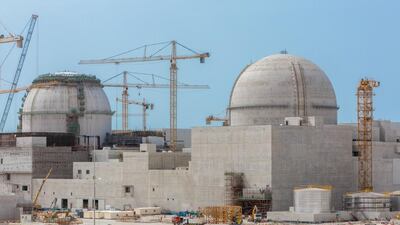ABU DHABI // The impact of the Fukushima accident on global nuclear programmes was significant, but experts say it is overestimated.
The incident, which took place after an earthquake in Japan in 2011, prompted reassessments from nuclear nations but a “renaissance” has been taking place in recent years, said Dr Nikolai Sokov, senior fellow at the James Martin Centre for Non-Proliferation Studies in Washington DC.
“The nuclear renaissance has continued in about half or somewhat more countries that, before Fukushima, sought to develop nuclear energy programmes, and termination [has occurred] in less than half the countries,” he said.
“The primary challenge to development of nuclear power programmes in countries that seek to continue is financial. The nature of nuclear power is such that it requires very large initial investment. The political will, however, seems to remain high.”
Although Fukushima did have an impact, so too did much lower oil and gas prices, which continue to play a role in swaying countries away from nuclear power.
“The current oil price is $45 to $50 per barrel,” said Elena Sokova, deputy director at the James Martin Centre for Non-Proliferation Studies, at the Middlebury Institute for International Studies at Monterey, California.
“It is much lower than the price before Fukushima - at that time, the cost of a barrel of oil was at $125 to $150.”
However, there has been a revival of interest in nuclear energy in the last couple of years in the Middle East, with the launch of programmes in Egypt, Saudi Arabia and Jordan, in addition to the UAE’s nuclear ambitions, which will come to fruition next year with the opening of the first reactor at Barakah, in the Western Region.
“Some countries pursue nuclear power to diversify their energy portfolio,” said Ms Sokova. “In some cases, decisions are mostly driven by political or prestige considerations, rather than economic calculations. The influence of Iran’s nuclear programme, including the completion and operation of the nuclear power plant in Bushehr, and the development of additional fuel cycle capabilities by Iran, cannot be ruled out as a contributing factor either.”
Others say projections for nuclear growth have been revised downwards recently and uranium is at the lowest price in a decade because of a lack of demand.
“Broadly speaking, there are two contradictory trends in nuclear energy worldwide,” said Miles Pomper, a senior research associate at the James Martin Centre. “On the one hand, developing countries continue to need massive amounts of new electricity generation capacity and there is a pressure to support low-carbon sources of energy. This helps nuclear.
“On the other hand, nuclear energy continues to be very expensive compared to other forms of energy, especially when oil and gas prices are low, so plants are closing in places like the US or being delayed in countries like South Africa and Vietnam.”
Lady Barbara Judge, former head of the UK Atomic Energy Authority, said nuclear had a good safety record, notwithstanding Fukushima. “Countries are looking for ways to get a good energy balance and nuclear is such a good source of carbon-free base-load generation,” she said.
The National today takes a closer look at the progress of nuclear energy in seven countries here.
cmalek@thenational.ae

